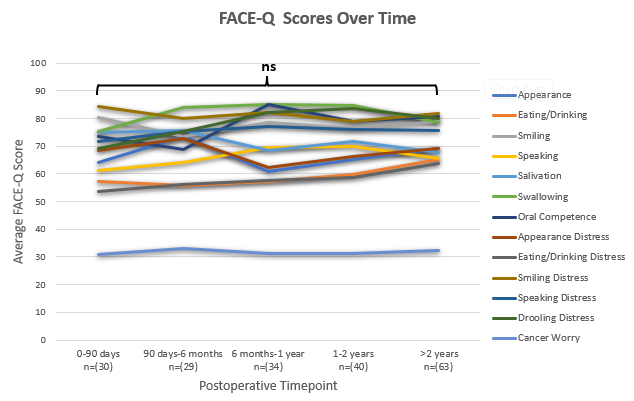Quality of Life Outcomes after Oncologic Free Fibula Flap Reconstruction of Mandibular Defects: A Longitudinal Evaluation
Kevin Zhang*1, Zack Cohen1, Louise Cunningham2, Minji Kim1, Jonas Nelson1, Jennifer Cracchiolo3, Farooq Shahzad1, Evan Matros1, Robert Allen Jr.1
1Plastic and Reconstructive Surgery, Memorial Sloan Kettering Cancer Center, New York, NY; 2Center for Speech and Hearing, Memorial Sloan Kettering, New York, NY; 3Head and Neck Oncology Surgery Service, Memorial Sloan Kettering Cancer Center, New York, NY
A comprehensive understanding of changes in health-related quality of life after head and neck cancer surgery is necessary for effective pre-operative counseling. The goal of this study was to perform a longitudinal analysis of postoperative quality of life outcomes after fibula free flap (FFF) mandible reconstruction.
A retrospective review was performed for all patients who underwent oncologic mandible reconstruction with a FFF between 2000 - 2021. Completion of at least one postoperative FACE-Q questionnaire was necessary for inclusion. FACE-Q scores were divided into five time periods for analysis. Functional outcomes measured with speech language pathology (SLP) assessments and tracheostomy and gastrostomy tube status were analyzed at three timepoints.
109 patients were included. 68 of these patients also had at least one SLP assessment. All outcomes as measured by the various FACE-Q scales and SLP functional domains remained stable from the immediate postoperative timepoint to the last evaluated timepoint (p>0.05). The percentage of patients who required a tracheostomy (18.3% to 1%, p<0.0001) or gastrostomy tube
(27.5% to 5.8%, p<0.0001) decreased significantly from the immediate postoperative timepoint to the last evaluated timepoint.
Subjective quality of life outcomes do not change significantly with time after oncologic FFF mandible reconstruction, and most patients experience persistent functional disability. Reconstructive surgeons can use these results to help patients establish appropriate and achievable quality of life goals after surgery. Effective pre-operative counseling may subsequently improve patient satisfaction in the post-operative period.
Back to 2023 Abstracts


